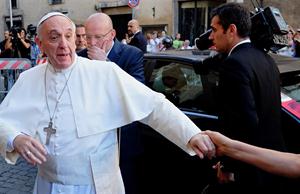An interview with Father José Conrado, from Cuba, by La Nacion newspaper.

By Ramiro Pellet Lastra | LA NACION
José Conrado describes himself as a “small-town priest.” But from his parish in Santiago de Cuba, or in the colonial city of Trinidad, to where he was transferred, he throws verbal darts with a “language of the barricade” against corruption, repression, and other hallmarks of the Cuban government. Close to the dissident movements, Conrado has suffered pressure, aggression and even exile. But he has continued denouncing the leadership of his country, as in this dialogue with LA NATION newspaper, during a visit to Buenos Aires, after attending the World Youth Day in Rio de Janeiro.
Conrado only set aside denunciation in favor of enthusiastic praise when he analyzes Francisco‘s performance at the head of the Church, a man he trusts, and whom he hopes that “when Dilma, Cristina, or whoever goes to kiss his hand, he tells them the truth.”
How do you see the Cuba of today?
– Cuba is a bankrupt country, economically and morally bankrupt. From a family point of view, it’s an eroded country. There is not a single Cuban who doesn’t have relatives abroad, including Fidel Castro, who has several grandchildren and a daughter outside of Cuba as political exiles. It is a country where everyone, for one reason or another, has suffered the imprisonment of a family member, the death of a family member, in front of a firing squad or in the Straits of Florida. It’s a country with a history of political imprisonment.
-Why in Latin America there are those who still have a good image of the Castro regime?
-I think there is a certain complicity of the Left that wants to see Cuba as paradisiacal paradigm of what Revolution is and what social accomplishments are. There is also an ongoing press campaign on the part of the Cuban government. And there are the visitors to Cuba, because tourists see Cuba from air-conditioned buses and from five-star hotels.
-People came out into the streets to protest in many countries, democratic and non-democratic, but they did not do it in Cuba.
-People in other countries saw a space for freedom that made them decide to forget the spaces of their fear. We haven’t yet gotten to that point. I believe we have a point where this will happen, but we aren’t there yet. In Cuba, a popular saying goes: There’s not one to turn the government over to, but nor is there anyone who can fix it. Everyone in Cuba knows we must have change. It is a silent and unanimous agreement among all Cubans.
Will perhaps a minor incident light the fuse like in the “Arab Spring”?
-Yes, that could happen. I think the government stays away from large crowds. They don’t have as many large demonstrations as before. I think the government has been very astute to not permit acts of unchecked violence on the part of the police. I think that people would throw themselves into the street [if such acts happened].
-And in this context, what prospects does the government have?
-The seriousness of the situation is forcing the government to think of another way out. Today they are proposing that those whom they always considered their eternal and bitter enemies, Cubans in exile, invest in Cuba..
As a Latin American priest, how did you experience the election of Pope Francisco?
-Francisco is a gift from God for a time of crisis. He is man who is above the conventions of the left and the right, because he goes for the essential, and the essential is God and the people who are suffering. Pope Francisco knows that he is a servant.
-Could he influence not only for Cuba, but for democracies in trouble?
-I think that he is going to have great influence, because the Church needs a reform from within. How is he going to preach to the politicians not to steal otherwise? A Church renewed from within is an example for these men who have great responsibilities.
-In addition to being an example, could Francisco influence through his discourse, through direct denunciation?
-Yes, of course. I don’t ask the Holy Father to speak the language of the barricade, like I, a small town priest, do, but I do ask him to be very firm with the rulers. That when Dilma, Cristina, or whoever goes to kiss his hand, he tells them the truth.
Translated by: Ernesto Ariel Suarez
1 August 2013
